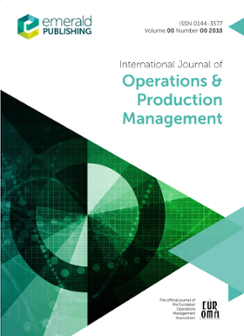Emerging technologies in emergency situations (Guest editorial)
IF 7.4
2区 管理学
Q1 MANAGEMENT
International Journal of Operations & Production Management
Pub Date : 2021-08-03
DOI:10.1108/IJOPM-07-2021-0481
引用次数: 0
Abstract
While scholars have identified the coordination mechanisms needed to provide a synchronised response to emergency situations such as natural disasters (Holguin‐Veras et al., 2012; Oloruntoba & Gray, 2006; van Wassenhove, 2006), the processes required to deploy emerging technologies during such situations had received limited attention (Dubey et al., 2020; Queiroz et al., 2020; Remko, 2020). Moreover, while recent scholarly work has considered the importance of organisational and dynamic capabilities in developing industry 4.0 technologies (Roscoe et al., 2019; Xu et al., 2018), the significance of fostering capabilities for the deployment of emerging technologies in emergency situations is under-researched (de Giovanni, 2019; Koh et al., 2019; Sarkis, 2012). More specifically, the scale of disruption caused by COVID-19 has amplified the challenges presented by natural and man-made disasters, increasing the need for new strategies, capabilities, and creativity in responding to emergency situations (Ivanov, 2020; Remko, 2020; Schleper et al., 2021). The aim of this special issue is to understand how organizations and their supply chain partners can build the capabilities and coordination mechanisms required to deploy and utilise emerging technologies in emergency situations. The special issue intends to stimulate a debate among academic scholars, practitioners, and government representatives on the latest advances in emerging technologies and their application in the context of natural and man-made disasters as well as disease outbreaks such as COVID-19.紧急情况下的新兴技术(客座评论)
虽然学者们已经确定了对自然灾害等紧急情况提供同步响应所需的协调机制(Holguin‐Veras et al., 2012;Oloruntoba & Gray, 2006;van Wassenhove, 2006),在这种情况下部署新兴技术所需的流程受到的关注有限(Dubey等人,2020;Queiroz et al., 2020;Remko, 2020)。此外,虽然最近的学术工作考虑了组织和动态能力在开发工业4.0技术中的重要性(Roscoe等人,2019;Xu等人,2018),在紧急情况下培养新兴技术部署能力的重要性尚未得到充分研究(de Giovanni, 2019;Koh等人,2019;Sarkis博士,2012)。更具体地说,2019冠状病毒病造成的破坏规模放大了自然灾害和人为灾害带来的挑战,增加了对应对紧急情况的新战略、新能力和新创造力的需求(Ivanov, 2020;Remko, 2020;Schleper et al., 2021)。本期特刊的目的是了解各组织及其供应链合作伙伴如何建立在紧急情况下部署和利用新兴技术所需的能力和协调机制。本期特刊旨在激发学术学者、从业人员和政府代表就新兴技术的最新进展及其在自然灾害和人为灾害以及COVID-19等疾病暴发背景下的应用展开辩论。
本文章由计算机程序翻译,如有差异,请以英文原文为准。
求助全文
约1分钟内获得全文
求助全文
来源期刊
CiteScore
13.30
自引率
17.20%
发文量
96
期刊介绍:
The mission of the International Journal of Operations & Production Management (IJOPM) is to publish cutting-edge, innovative research with the potential to significantly advance the field of Operations and Supply Chain Management, both in theory and practice. Drawing on experiences from manufacturing and service sectors, in both private and public contexts, the journal has earned widespread respect in this complex and increasingly vital area of business management.
Methodologically, IJOPM encompasses a broad spectrum of empirically-based inquiry using suitable research frameworks, as long as they offer generic insights of substantial value to operations and supply chain management. While the journal does not categorically exclude specific empirical methodologies, it does not accept purely mathematical modeling pieces. Regardless of the chosen mode of inquiry or methods employed, the key criteria are appropriateness of methodology, clarity in the study's execution, and rigor in the application of methods. It's important to note that any contribution should explicitly contribute to theory. The journal actively encourages the use of mixed methods where appropriate and valuable for generating research insights.

 求助内容:
求助内容: 应助结果提醒方式:
应助结果提醒方式:


